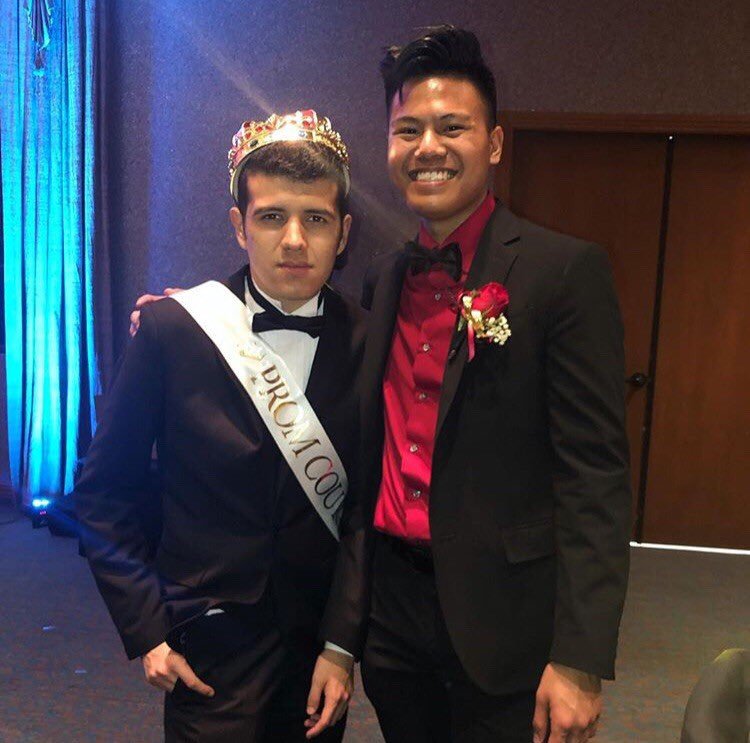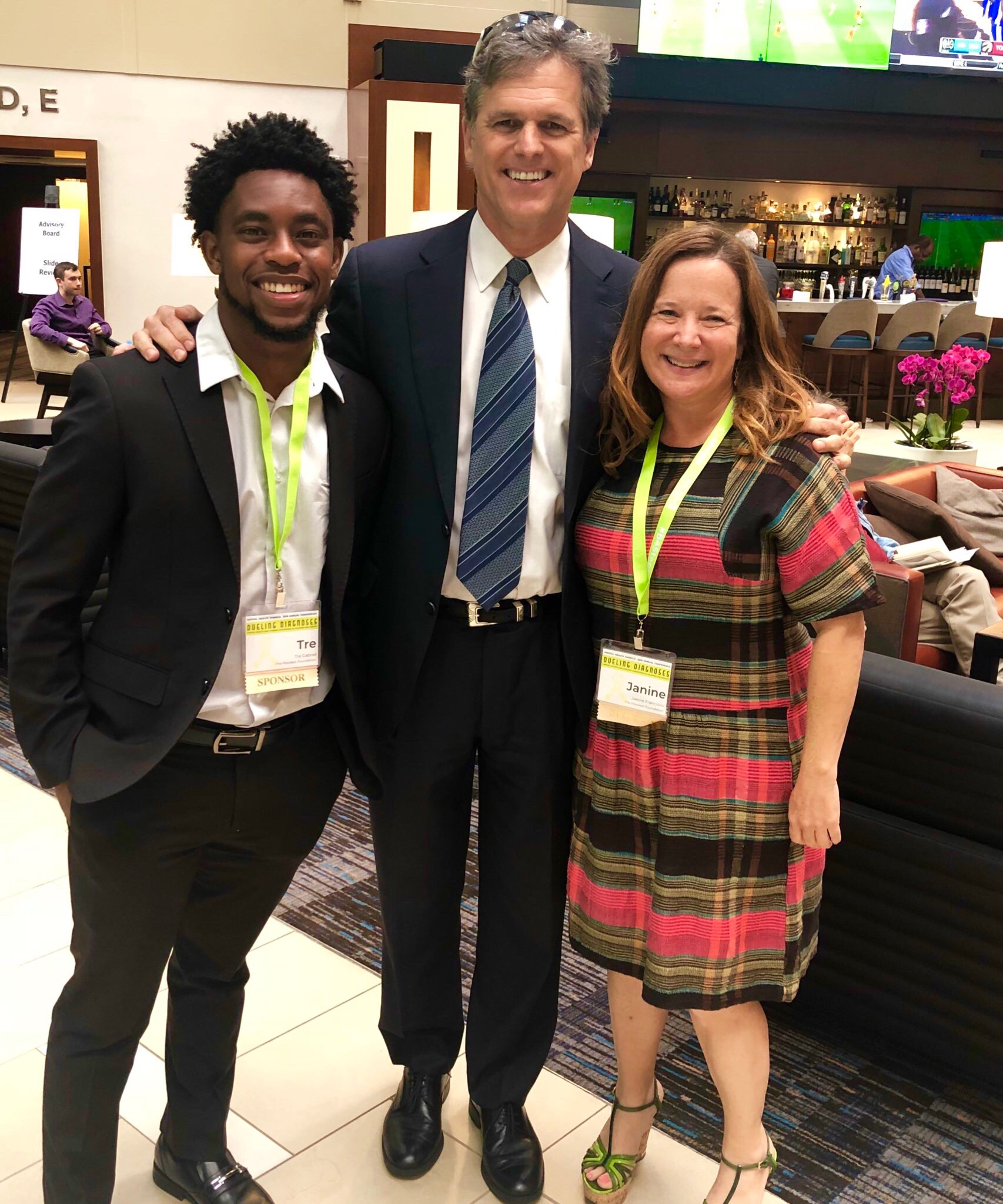
Classmates Edgar Hernandez and Shaun Mabanta
“Schools all over the country are looking at the issue that they call ‘social and emotional learning’: how do they teach kids age-old values like character and grit and perseverance, openness, trust, and listening, all these kinds of qualities that we need to put into our schools. The irony here is: what we’ve discovered in the Special Olympics movement is that the teacher has become the athlete. The Special Olympics athlete who everyone thinks we’re there to help has actually become almost the new professor in the school, and so what we’re seeing in our Unified Champion Schools model is, young people with autism and with Downs Syndrome and with William’s Syndrome: they’re actually acting as the leaders of a more inclusive culture, they’re showing others how to overcome fear of difference, and for us, it’s an extraordinary moment.”
— Dr. Timothy P. Shriver, Chairman, Special Olympics International
This past spring, there was a moment when government funding for the Special Olympics was almost cut. This coincided with the start of prom and graduation season, putting the issue of social exclusion to the top of our minds. It is no accident that exclusion practices get worse in adolescence—during a time when social relationships are especially important—and when being rejected can cause the most damage.
We sat down with Dr. Robin Stern, Associate Director of the Yale Center for Emotional Intelligence, to discuss bullying. “People think that the way to address bullying is to bring bullying prevention programs into schools,” Dr. Stern said. But research shows that anti-bullying programs in schools are not as effective as we had hoped. “Just getting rid of bullying doesn’t produce compassion,” Dr. Stern emphasized. “What we know works is building skills for emotional intelligence in schools, both for kids and adults, and also building a positive climate with the work of social/emotional learning.”
Like any form of emotional intelligence, kindness needs to be modelled before we can expect children to practice it. Modelling is how children learn, and if we want young children to start practicing compassion in their elementary school classrooms, they need to be exposed to those same practices at home and at school, day after day. “This is Education 101,” Dr. Shriver said. “What do you send your kids to school for? Read, write…of course. But to learn how to respect the fact that everybody matters? Big lesson.”

Our founder Janine Francolini and Intern Tre Gabriel with our flawless hero Tim Shriver
Just as adults can model kindness, they can also model exclusion. We discussed this idea with Paula Resnick, one of our favorite thought leaders in the field of social and emotional learning. Paula is the founder of The Meeting House, an organization in New York City that provides children with extra support in their social development through after school programs. She shared the idea that kids learn exclusion from adults and we need opportunities to unlearn it. She also talked about how technology and social media are adding complexity to kids’ social interactions, and how this is especially difficult for children with social challenges.
Research shows that social isolation poses a further risk to brain health. A study from California Institute of Technology revealed that after only twenty-four hours in isolation, changes can be observed in both aggression and fear responses. Time has recently published statistics suggesting that social isolation is associated with a 43% greater risk of heart attack, and 39% greater risk of a stroke. Social isolation isn’t something that can be left behind on the playground: its health risks have a long-term impact.
At the height of what can be an especially exclusionary season, you might be wondering: if bullying prevention doesn’t work, what does? Here is the good news: people can change by learning new behaviors. This is why it is crucial that adults embody kind, compassionate behavior that will teach a culture of inclusion.
Unlearning exclusion needs to be explicitly taught, and it is an especially powerful when modelled by peers. Events like prom and graduation parties can do the opposite: holding up a mirror to painful exclusionary practices among high school students. In certain ways a rite of passage, prom can be a reminder to students of just how much they are on the outside looking in. And graduation celebrations, while on the surface simply academic rites of passage, have increasingly become symbols of social status and stratification. Graduation parties are one final opportunity for a student to revel in her high school popularity—or to feel the loneliness of social isolation.
Gratefully, the risk to Special Olympics funding cuts was short-lived, and the “inclusion revolution” will continue because of the importance of these values in our society. In other words: inclusion is a gift to all of us. But behind the gift is the skill that created it, and this skill needs to be taught, practiced, and passed down from parents to their children and teachers to their students, but especially from students to other students. Adults model inclusion and students are the ones who can really make an impact, by bringing inclusion into their schools in ways that are both everyday and extraordinary.
Resources
Recent popular culture has done a good job of addressing the issue of exclusion in ways that reach kids:
Tony and Grammy Award-winning hit musical Dear Evan Hansen has paved the way for recent popular culture to address exclusion in ways that reach kids and adults:
The Prom is another acclaimed Broadway musical that follows the story of two teenage girls who want to go to prom together as a couple, resulting in the prom being cancelled in their conservative Indiana high school:
Be More Chill is another musical that addresses issues of popularity and painful social exclusion through the eyes of Jeremy, who feels like an outcast at school.
The documentary Prom Night in Kansas City explores how prom has become a loaded symbol for a fitting in.
Ellen DeGenerous hosted teenagers Anthony and Jacob on her show as an example of how we can use prom to challenge stereotypes. https://www.youtube.com/watch?v=znt3BPKUMCY&feature=youtu.be
When Kaylah had trouble nailing down a date to the Lancaster High School Senior Prom, she decided to ask her grandfather, Alvin Hackett, to accompany her. After Kaylah posted a picture, her tweet went viral, earning over 105,000 likes.
https://www.insider.com/photos-teen-without-prom-date-goes-viral-after-grandfather-steps-in-2019-4
When Edgar’s popular classmate, Shaun, was elected Prom King, he gave his crown and title to Edgar, who has autism, making strides towards inclusion.






